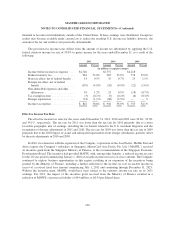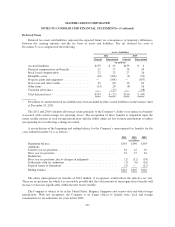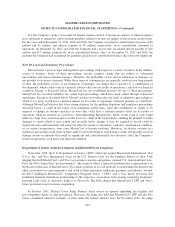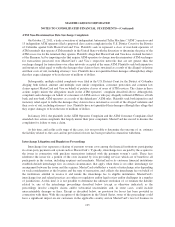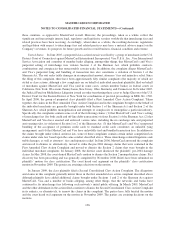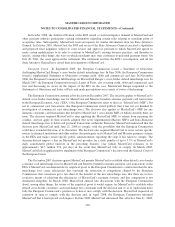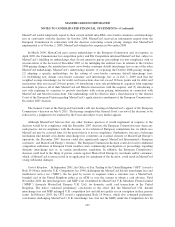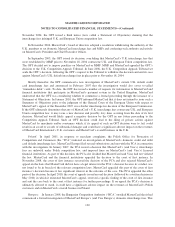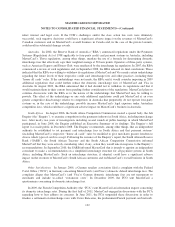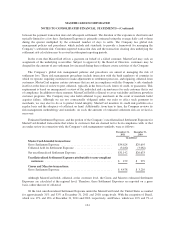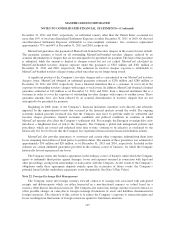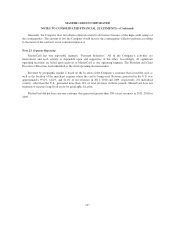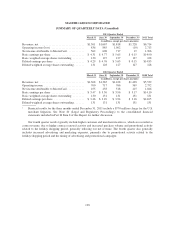MasterCard 2011 Annual Report Download - page 132
Download and view the complete annual report
Please find page 132 of the 2011 MasterCard annual report below. You can navigate through the pages in the report by either clicking on the pages listed below, or by using the keyword search tool below to find specific information within the annual report.MASTERCARD INCORPORATED
NOTES TO CONSOLIDATED FINANCIAL STATEMENTS—(Continued)
In October 2008, the Antitrust Division of the DOJ issued a civil investigative demand to MasterCard and
other payment industry participants seeking information regarding certain rules relating to merchant point of
acceptance rules. Subsequently, MasterCard received requests for similar information from ten State Attorneys
General. In October 2010, MasterCard, the DOJ and seven of the State Attorneys General executed a stipulation
and proposed final judgment, subject to court review and approval, pursuant to which MasterCard agreed to
make certain modifications to its rules to conform to MasterCard’s existing business practices, and therefore to
specify, among other things, the ways in which merchants may steer customers to preferred payment forms. On
July 20, 2011, the court approved the settlement. The settlement resolves the DOJ’s investigation, and all ten
State Attorneys General have closed their investigations of MasterCard.
European Union. In September 2003, the European Commission issued a Statement of Objections
challenging MasterCard Europe’s cross-border default interchange fees. In June 2006, the European Commission
issued a supplemental Statement of Objections covering credit, debit and commercial card fees. In November
2006, the European Commission held hearings on MasterCard Europe’s cross-border default interchange fees. In
March 2007, the European Commission issued a Letter of Facts, also covering credit, debit and commercial card
fees and discussing its views on the impact of the IPO on the case. MasterCard Europe responded to the
Statements of Objections and Letter of Facts and made presentations on a variety of issues at the hearings.
The European Commission announced its decision in December 2007. The decision applies to MasterCard’s
default cross-border interchange fees for MasterCard and Maestro branded consumer payment card transactions
in the European Economic Area (“EEA”) (the European Commission refers to these as “MasterCard’s MIF”), but
not to commercial card transactions (the European Commission stated publicly that it has not yet finished its
investigation of commercial card interchange fees). The decision also applies to MasterCard’s MIF for any
domestic consumer card transactions that default to MasterCard’s cross-border MIF, of which currently there are
none. The decision required MasterCard to stop applying the MasterCard MIF, to refrain from repeating the
conduct, and not apply its then recently adopted (but never implemented) Maestro SEPA and Intra-Eurozone
default interchange fees to debit card payment transactions within the Eurozone. MasterCard understood that the
decision gave MasterCard until June 21, 2008 to comply, with the possibility that the European Commission
could have extended this time at its discretion. The decision also required MasterCard to issue certain specific
notices to financial institutions and other entities that participate in its MasterCard and Maestro payment systems
in the EEA and make certain specific public announcements regarding the steps it has taken to comply. The
decision did not impose a fine on MasterCard, but provides for a daily penalty of up to 3.5% of MasterCard’s
daily consolidated global turnover in the preceding business year (which MasterCard estimates to be
approximately $0.5 million U.S. per day) in the event that MasterCard fails to comply. In March 2008,
MasterCard filed an application for annulment of the European Commission’s decision with the General Court of
the European Union.
The December 2007 decision against MasterCard permits MasterCard to establish other default cross-border
consumer card interchange fees for MasterCard and Maestro branded consumer payment card transactions in the
EEA if MasterCard can demonstrate by empirical proof to the European Commission’s satisfaction that the new
interchange fees create efficiencies that outweigh the restriction of competition alleged by the European
Commission, that consumers get a fair share of the benefits of the new interchange fees, that there are no less
restrictive means of achieving the efficiencies of MasterCard’s payment systems, and that competition is not
eliminated altogether. In March 2008, MasterCard entered into discussions with the European Commission
about, among other things, the nature of the empirical proof it would require for MasterCard to establish other
default cross-border consumer card interchange fees consistent with the decision and so as to understand more
fully the European Commission’s position as to how it may comply with the decision. MasterCard requested an
extension of time to comply with the decision and, in April 2008, the European Commission informed
MasterCard that it had rejected such request. In June 2008, MasterCard announced that, effective June 21, 2008,
128




